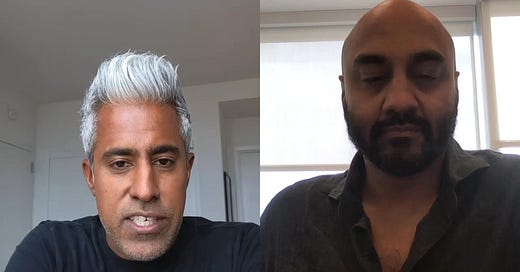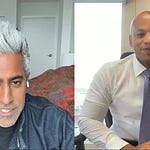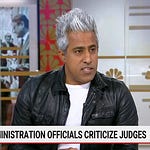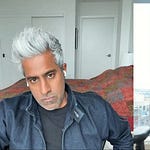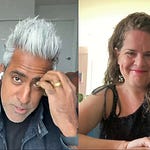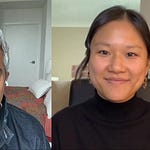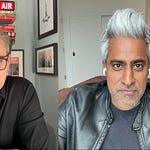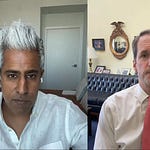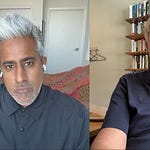Yesterday, we posted Anand’s conversation with playwright S. Shakthidharan about his play, Counting and Cracking, which runs through Sunday at NYU Skirball, presented by the Public Theater. We bring you the video, plus a full, edited transcript of the conversation — and if you’re in New York City or can get there this weekend, we encourage you to get tickets.
The Australian playwright S. Shakthidharan’s Counting and Cracking is a sweeping, multigenerational, and multilingual family epic (it runs nearly three-and-a-half hours, and the mostly South Asian cast delivers the story in English, Tamil, and Sinhalese), but it is also the story of how democracy and pluralism came apart in Shakthidharan’s native Sri Lanka, where his grandfather served as a cabinet minister before the civil war that wracked the country from 1983 until 2009.
Anand caught up with Shakthidharan this week after seeing the play performed, and the two talked about how he came to write the story, what he learned while researching his family’s history and deep connection with the history of Sri Lankan democracy, and what the play has to tell us about the current American political condition and how quickly a society can find itself turning the corner from neighbors to enemies.
I'm very excited to be talking with great playwright S. Shakthidharan, who has this incredible new play, which I saw in New York, called Counting and Cracking. Thank you so much for talking with The Ink.
Good to see you, man.
On the night that I saw the play, which just blew me away, blew my wife away, that although it was a play about democracy and pluralism in Sri Lanka, it felt like one of the most important interventions in the cultural dialogue around the American 2024 election that I had in a while.
It may not have been the intention, I'm sure it was, but it landed that way for a lot of us in the room who were talking about it afterwards. And I wanted to start with the title, Counting and Cracking, because the play is about the straining and breaking of democracy and pluralism in Sri Lanka and the turning of all against all, or group against group. And there's this notion that you quote, of democracy as counting sometimes and cracking sometimes. What is counting and what is cracking in the context of the play?
Yeah, so the play is called Counting and Cracking, and it comes from a quote from my great-grandfather, actually, who was a politician in Sri Lanka. And he wrote in a letter, "Democracy is the counting of heads within certain limits and the cracking of heads beyond those limits." And for him in Sri Lanka, what that meant was that he spent the early part of his political career as a lonely Tamil in an otherwise Sinhalese political cabinet in the government of Sri Lanka.
And he was a champion for equality. And you know he really fought for that for many years. But by the end of his political career, he had given up on government as a place which would adequately support minorities and by then was starting to violently persecute them.
And he dealt with this by retreating or advancing, depending on your political point of view, into a version of his more tribal self, his more village identity, growing up in Jaffna, in his village of Urumpirai, where they resisted intruders into their village way of life, whether it be the British or the nationalistic government.
He has a memory of his mother breaking pots over the heads of the British who tried to come in and tell them how to live their lives. And he kind of finished his life brokenhearted by the civil war that was breaking out in Sri Lanka and talking about sometimes needing to crack heads in self-defense to protect one's community and one's way of life and having given up on the possibility of counting in Sri Lanka, even though he'd spent most of his political life fighting for that.
So counting — democracy as this notion of, you know, kings used to decide things. Now we decide things by counting who wants what —
Yep
Versus cracking.
And what we're talking about here is self-defense. Just to be clear.
And you know the play illustrates how you get from one of those moments to the other. The turning point, and because it is masterfully done as a family story, not a story of millions of people, but a story in this case of a dozen or so people, multi-generational family, friends, et cetera. You see this turning from a faith in counting to maybe a reluctant embrace of cracking happening to actual people.
And that's, I think, you know to ground the discussion today, that's what really resonated with me because it feels, as I'm sure you know, as an observer, it feels like the United States, but many countries in the world, are at a similar inflection point today where the faith in counting as the way we do progress, as the way we choose the future, which has been a very powerful kind of 300-year faith. It's been maybe the dominant idea of the last 300 years in many places around the world. That faith in counting itself appears to be cracking.
Yeah
And interest in and flirtation with the cracking approach — not always in self-defense, frankly, often on the offense, whether it's kind of lynchings in India related to religion, whether it's kind of wink-wink violence advocacy in the United States, calling Haitian immigrants, you know, pet eaters, and then just letting people do whatever they might do — the world, and certainly the United States, is at this inflection point of counting and cracking. And I can't imagine that you were unaware or uninterested in speaking into that inflection point. So can you talk about how you took this story, this family story, this thing from some time ago, but also framed it to be an intervention in other places at that inflection point?
Yeah, absolutely, man. I mean, I think one of the things that learning about what happened in Sri Lanka did to my mind and also my soul was dissolve the cynicism that I think our generation sometimes has around politics. And it's become convenient to entertain notions of cracking, or even if you're opposed to it politically, to kind of accept that it's going to happen because people are starting to lose their trust in institutions and their faith in counting, you know this beautiful framework we have for our conversation.
And going into my own family's story and learning about how my own family fought for democracy to stay in Sri Lanka in a way that protected minorities, especially that their lives, you know the stakes of their lives were around that really made it clear to me that we can't afford that cynicism in other countries. And the decisions we all make in the Western democracies we've settled in will affect the future of our countries.
I think in terms of how I came about writing the play that way, the given notion about Sri Lanka, a lot of the books about Sri Lanka, the way the media talks, is about a divided island. You know, that's the classic headline. But the more I talked to Sri Lankans all around the world for about five or six years. And the more I talked to them and listened to them, the more I found that it was a deeply interwoven country and a deeply pluralistic country.
You know, in Colombo there’s a street in which you have a church next to a mosque, next to a temple. The only thing that's weird in Sri Lanka is atheists, right? And it became convenient in Sri Lanka in around the mid-1950s to accrue political power by appealing to majoritarianism. And the guy who first started doing this, Bandaranaike, didn't even believe in it. He did it because he was supposed to be next in line for leadership of the ruling centrist party. And the guy who was ruling it decided not to give it to him. So Bandaranaike formed his own political party and was thinking about, "How can I win power?" You know what? I'm going to try the 51-percent route to power and appeal to people on the basis of a linguistic majority and say it's their island.
And it worked. He managed to win the next election. He didn't speak Sinhalese very well. He wasn't a proponent or believer in his own things that he said in public life. But he couldn't roll it back. And this is the really important lesson for America and Australia, I think, and other Western democracies. Once these ideas of nationalism, majoritarianism are put into public life, once these dangerous ideas are said publicly, they're very, very hard to pull back. Even if the leader who did it wants to pull it back, they sometimes can't. And Bandaranaike was eventually assassinated by an extremist Buddhist monk who was not willing to let him roll back his policies of nationalism.
And from a Sri Lankan perspective, from using my homeland as a cautionary tale for America, what scares me is not what Donald Trump is saying in public now, so much as how the words he's saying seed thoughts in the people of America that will ferment and grow over the next few decades and how hard it will be to bring that back and that faith back that I was talking about at the beginning of this bit. And that's what's really scary and dangerous.
And the public narrative and the story we have about our country, the public narrative, is so important. And how to retain the deeply pluralistic idea of America and interwoven idea of America, regardless of what happens as the election, as the key story of this country is, I think, just as important a battleground.
You know, hearing you talk about Colombo, where I went on my honeymoon, I should say.
Oh, nice.
It reminded me of you know my grandfather talking about growing up in Lahore in pre-partition India before it became part of Pakistan. It was a similar kind of description of how we were in and out of our neighbors of different religions’ homes. We were celebrating each other's feasts and festivals. And then suddenly history intervenes. The British pull out in this terrible way, and millions of people are affected, many people killed.
But it kind of makes me wonder sometimes when you're talking about the Colombo street or Lahore, I wonder if you think as a playwright, observer of humanity, the natural condition of human beings is the crowded, messy, pluralistic Colombo street, and we get manipulated into tribalism or whether you think the natural condition of people is to stick to their own, to stick to their own kind. And pluralism is this incredible but fragile invention that has been kind of put on people and that can be taken away.
Yeah. You know I think about this question a little bit every day, I think. It's the age-old question. And I would say that before writing Counting and Cracking, I came from a position where I thought that humans were kind of ingrained in their tribalism. And that pluralism was this idea that we had to push to work against that. But honestly, now that Counting and Cracking had a premiere in 2019 in Australia, it's been to the UK in 2022, and it's been amazing bringing it to America this year. Now that I've seen this journey of this play, I don't think that's true anymore. You know I think that we are fundamentally human beings who desire connection. And we are fundamentally more similar than we are different.
It's been an incredibly rewarding project for me. I think to talk about the microcosm part of it first, just with the Sri Lankan community, the Sinhalese response to Counting and Cracking has been just as incredible as the Tamil response. You know The Tamil response has been one of healing, finding a way to use theater to address some buried pain and to start conversations again between parents and children, to learn what our ancestors went through, and to keep that wisdom with us.
But the Sinhalese reception has been one to say, "You know what? We should not have let what we knew was not right happen without condemning it more openly. And we want to condemn it more openly now. And we aren't a country in Sri Lanka that, you know, is divided along ethnic lines. And we do have more in common with each other than we thought we did.
And the Tamil response to that has been really genuine and welcoming too. So you know the kinds of things that I would have thought were idealistic or cheesy before doing the play, the play has made real for me. It really has provided a path for reconciliation for my community and has allowed us to view who we are without viewing it through purely racial lines without stepping away for what needs to be done for justice or equality in the future.
And I think I'm obviously biased towards this perspective, but I think what that shows is that storytelling and what our identities and beliefs are cannot be separated. You know, literally, what we believe depends on the stories we tell ourselves. And I think our advertising companies would agree with that. I think therapists would agree with that. I think the people who wage politicians' campaigns would agree with that. They'll tell you that the story people have about presidential nominees matters the most, you know in their heads in terms of who they vote for. And so this is the battleground we're in. You know, the stories we tell ourselves eventually underlie all our beliefs and therefore the actions we make.
And so we have the capacity for both in us. And if we tell more stories and reclaim more of the space within identities of pluralism, then we'll allow that forest to grow more than the other swamps and deserts that live inside our psyche.
I grew up due to America's wonderful, wonderfully successful cultural imperialism. I, like so many people around the world, grew up watching Hollywood films. And I found ways to identify with coming-of-age stories about kids in American towns, even though I really had nothing you know in common with them in terms of my lived experience. And I still found ways for those stories to resonate with me. But now Counting and Cracking has gone to like 30, 40, 50,000 people around the world. And it's not just Sri Lankans who've embraced it, not just South Asians. You know It's been embraced by so many different types of people.
And so this interesting thing happens in the audience. I think you and I talked about this very briefly at the opening night where initially they come into the show and go, "Oh, this is not for me. This is about a family that's very different for me. I don't know anything about Sri Lanka." And then you know they say, "I'm here to learn. I'm just going to be educated and entertained." But as the play goes deeper and deeper into this family, they say, "This actually is about me and my country and the secrets our family holds from us, the things we do for or against love, and yeah, what our country is and how we believe in that changing the future of it is about all of us." And so that's another way for me, I think, that proves that we are deeply pluralistic people and understand that because given the right conditions, there's been no one on the earth from any different background has had a problem empathizing and resonating with the Sri Lankan story.
Wow.
And that has to mean something about who we are as people.
I wanted to ask about something. Close listeners to your accent will note that Sri Lanka is not the only aspect of your story. Talk about your relationship to Sri Lanka as a homeland in a diaspora growing up and how you decided you wanted to kind of quote-unquote "go back" into your own past to tell this story.
I'm sure it's the same for migrants who come to the U.S. I mean, I hit my late 20s and I kind of had this realization that if I didn't know my family's history and my ancestors' stories, then I didn't really know who I was.
And you were in Australia?
I was in Sydney, Australia.
And were you born there or brought there?
I was born in Sri Lanka in 1982. War broke out in 1983, and it broke out in a series of riots that happened across Colombo where I was living. And because of who my great-grandfather was and because, you know, half the city was on fire, my family felt we weren't safe. And so we left in 1983 when I was a one-year-old. I got to Australia by the time I was three. We went via India and Singapore. And I've grown up in Sydney since I was three.
And my mother never talked about Sri Lanka growing up. She was deeply connected to kind of the aesthetics and performance of Tamil culture because she's a Bharatanatyam dancer, but never the history or the politics. And so I really assimilated in Australia. And yeah, I hit that moment in my late 20s where I thought, really, I don't know who I am, you know. And I think people kind of migrants kind of face a crossroads at that point. They either repress further or give up the game. And they're like, you know what? I'm never going to figure that out.
What was it in your twenties? What did you collide with or confront that made you realize not knowing that was missing?
At the time, I felt it as a deep need and a deep yearning. I think I know what it was now, but I didn't know at the time.
So at the time, it just was like this strange pull in my chest you know of a certain kind of emptiness, I think. But now I think I know what it was. My mom was very strong in her culture like I said, and she was a Bharatanatyam dancer. And so I had access to the fact that the Western way of thinking is not the only way of thinking. Like whether it be post-Enlightenment thinking, a capitalist system, I really knew that that was not the only way to exist. And yet, I hadn't touched enough the way of thinking that had manifested all the people in my family or my community and why it made us so different. You know And so I knew that there was this whole entire other way of being in the world, of a philosophy of existence, that I had access to, but I hadn't explored.
And I knew that — maybe it's the anti-authoritarian in me. I don't know — it didn't feel right.
I guess here it is. There you go. Thanks for letting me get there. I didn't feel like I belonged yet in Australia. Yeah. And I knew that I could find a sense of belonging. I hoped that I could find a sense of belonging by better understanding this other way of being and then finding a way to blend the two together.
Yeah. I didn't want to belong purely on the terms Western or White Australia was giving me. But I wanted to fight for the right to belong in that country and still be in Australia.
It's so interesting. I mean, the highest compliment I can give to you about the play, in addition to it being incredibly topical and all the ideas and stuff about democracy we're talking about very resonant.
But honestly, speaking very personally while I was sitting there, there was another thing happening that was completely separate from all of that, which is that I had this sense similar to what you're describing of realizing that there is this whole other place that I come from.
You know I lived in India for six years. I was born in the United States, but I moved to India, even though I'd never lived there before when I was out of college. I became a reporter for The New York Times there. I lived there for six years, unlike most people in a diaspora. So I'm very connected to India, but I'm also very disconnected from it. You know I also live in a mostly white world in the United States of America, and I'm very happy in the world that I'm in.
And I'm watching your play, I had these kind of pangs of like, just the way people sit or the way people say something. And it's not even India, it's Sri Lanka. But there was just such this, the way a mother can love through rage, you know? And I had all these pangs, like there's parts of myself that I've lost, right, through what is fundamentally, for me, a story of the great fortune of our family coming to this country. So that felt very real and powerful.
And I also wonder how you obviously have your family story, you have your own memories. But you also clearly talk to lots and lots and lots of people to flesh it out beyond your own story, which you didn't have to do. Sometimes people don't do that. Why did you do that? And what did you find that you didn't know just from your own family history?
I mean, just to respond to the first part of what you said and then to come back to your question, because I think it's so important. The thing I didn't know about Counting and Cracking, what it would do, is how the way it performs in cities with pluralistic societies is a radical act of belonging for minority communities in the audience because that act of pulling together what we love about the West and the fact that we come from and are part of the East for us, South Asia, if it's only done in private, if we only do it when you and I talk privately through a bottle of whiskey you know late at night families — I mean, I would love to do that — but if it stays with that, if it never enters public life, then we're always belonging with conditions. And I didn't even freaking realize this when I was younger, that I was belonging with conditions because I'd accepted it as my state.
What do you mean by belonging with conditions?
Well, I think because we're simply too afraid to say, fully vulnerably, what we are in public. You know We're always performing a way of assimilating or fitting into — for you American culture, for me, Australian culture. And Counting and Cracking is our community in all its glorious messiness on stage for three-and-a-half hours just doing its thing, its good bits and its bad bits and its in-between bits and the way people sit and stand and love and move.
And I think that's a radical lack of belonging. It's taken me years to realize it. And the way I realize it is because people keep coming up to me and go, "Why do other people love this story so much?" you know The Sri Lankans keep coming up and going, "Well, how come everyone else loves this story?" And it’s when our story is embraced by mainstream society, that's how we belong, you know.
And so those pangs that you were feeling to be able to talk about that in public life and to have that addressed, I think I've come to realize is an important part of us building a proper, secure life in these Western democracies. And theater can do this weird magic where it can build the things we've lost so we can see them again.
One of the actors in the show, I'll never forget this moment, came up to me during rehearsals and said, "There's a scene in the show that's set in 1956." And he said, "You know, my grandparents were killed in the war, and I never got to meet them. But through this scene and this show,” because he's literally acting in the scene, “I feel like I get to hang out with my grandparents again you know and live the world that they were living in.” And that stuff is so important. You know It's a way of reconnecting to what we lost.
And in a sense, the whole play is a way for me to talk to my great-grandfather who I never got to meet. It's a way for me to have a dialogue with someone. And hopefully, he won't be upset at what I've done with some of his writings.
You'll only find out later.
Exactly.
The ultimate review.
That's right. But in terms of your second question, I mean, I think it allowed me to get at the stuff that we don't talk about in our community, like just very quickly to say like what we don't talk enough about inside South Asian circles is how much class and caste dictate what we do.
We don't talk enough about the ways in which the displacement we've been through does mean that our parents often love us through rage. And yes, we're great at becoming doctors and lawyers and you know your success and my success. We work hard, man, but are we good at being emotionally mature with our parents and with our children?
And so getting broader than my own family allowed me to address these intra-community issues, which I think is so crucial. And I think just to bring it back to democracy and discussion of democracy, I think it's really important to understand politics that way too because actually, in Sri Lanka, our leaders divided us. And what that meant was that upper-middle-class and upper-class Tamils and Sinhalese had more in common with each other and moved in each other's circles more than upper- and middle-class Tamils and poor Tamils did, or upper-middle-class Sinhalese and poor Sinhalese did.
And you know this is an offer. I don't know enough about American politics, but I feel like that's so relevant to what's happening now in the U.S. And you know poor white workers in the smaller or medium-sized towns in America, probably there are leaders out there who could find ways for them to unite with workers of color in different parts of the country, were those narratives to be more vibrant and strong in the U.S. But at the moment, those narratives aren't coming through. And there are leaders who are finding ways to divide us when actually, if you look at the economics of the situation, the people who are supposed to be opposed to each other may have far more in common than the stories about them suggest.
I don't know if you've ever read the great Indian psychoanalyst Sudhir Kakar, who actually recently passed away. An incredible, incredible writer who was a writer and a scholar, but he also saw patients, and he was able to do what I always felt was like the most productive kind of generalization because he'd had 1,000 people sitting on a couch telling him their innermost inner life. And so he was able to say sweeping things about the Indian view of marriage or things like that, that if anybody else had said it, you'd say, you know, “Where do you get off?”
Yeah, yeah, yeah.
But it was grounded in something very real. And he talked about how the immigrant stories, diaspora stories, so often it is told as a story of uplift, of up, an upward arc, right? Whether it's a privilege, whether it's someone graduating from engineering school and moving to the West to work for Boeing, or it's a migrant getting the hell out of a death spiral in Honduras and being a farm worker, it's still told as an onward and outward story, right?
After all, people leave to improve their conditions, not make them worse. And he said you know he said to me once that what that crowds out is stories of loss, and stories of loss that are as central or in some ways as significant, end up being as significant in a life as the story of the gains. Because one wants to be grateful, one is grateful, one has more money than one would have had otherwise, one has life that might have been threatened in another place. And so one doesn't want to face or speak about the loss.
And I think of your play as also challenging that silence. There's a wonderful book that came out last year called They Called Us Exceptional by Prachi Gupta. I think also in this space of, “Hold on. Let's tell the true story of what displacement — even generative displacement — actually does to people.”
Can you talk about that silence and the desire to correct that silence?
Yeah. Absolutely. I mean, that is my mother's story. You know She was so against me writing this play. And I didn't know why. She just kept going, "This is a very stupid idea. You're being very stupid. Stop it.” Over and over again as South Asian moms do. Things are not said once. They're said several hundred times, hoping that the force of it makes it true. And I ignored her and I worked and listened to hundreds of other Sri Lankans instead.
But she started to open up during the development process of making the play. Because she's a dancer, she felt more capable of talking to other actors about what happened to us in Sri Lanka than she did me because she was around a stage in a rehearsal room. And the more she opened up, the more I kept putting what she was opening up with into the play.
And I learned that the reason she was telling me it was a stupid idea is because when war broke out in Sri Lanka, she had to go through a period of time in which, in this country that was her first love and her source of idealism, literally people were killing each other on the streets. And we were being targeted just because of the race we were. And it broke not only her heart but her sense of, you know, possible political idealism or social idealism and pluralism. And she dealt with that by coming to Australia and never thinking about it again. And part of this urge, I think, we have, to work hard and succeed and continue that upward journey is that it's a very good way to squash the loss. It's a very good way to say, "Let's roll up our sleeves, contribute to this country," all of which is wonderful. I'm not disparaging that at all. But it's a very good way of allowing us to also go, and let's never think about the pain that brought us here, the pain that forced us into this.
And what really started to come out of my mum as the act of making this play gave her a safe space in which to start healing those old wounds, was for her to say no one wants to leave their homeland. You know, we're afraid of saying this out loud because we do feel grateful for the countries that have accepted us, but no one wants to leave their homelands.
We do because we're forced to or we feel desperate enough to. And the pain of leaving that place always sits within us, you know. And then it gets passed on to the kids. And it's this little second shadow we have, right? That's always with us. It's tethered to our bodies. And if you think about that from a psychological or philosophical point of view, you don't have to be a migrant to understand that.
The best things in your life actually often come through a period of pain. Like, the most hard-won truths that we encounter, that grow us as people, unfortunately, part of the human condition is they usually come through something that was very difficult, a period of pain, a great loss. And so as migrants, I think we cheat ourselves of some of the greatest insights we're capable of if we don't listen to that loss. Not because you know we have to embrace or wallow in that loss, but because facing it allows us to go through the fire of what facing that loss gives us that we couldn't have otherwise. It is that deeper sense of belonging.
And something that I've come to realize is that cities can either ask us to discard parts of ourselves to fit in or ask us who we fully are to help grow and change what that city can be. And I know that I want the second option. And part of that is mainstream politics and the power and the privilege bending and morphing to allow us to give that. But the second part is us being strong enough in ourselves and facing that loss deeply enough to know what to give when we have that opportunity to change the city and let it become what it can be because of who we fully are.
And yeah, telling stories like this is the small contribution I can make to that bigger task we all have.
I do not want to accuse you of being a right-wing nationalist in any way — but when you said that no one wants to leave their homeland, that if in a way conditions were different, that resonates, but it also, in a way, sounds very close to what people on the very far end of the spectrum from you say, which is that you know in an ideal world, everybody's kind of happier in their place and that people should ultimately stay there. But you are clearly a pluralist. You want these kinds of cities where people are bumping into each other. How do you square that notion of, you want to live in that kind of world, but at some deeper level, everybody wants to be in their homeland?
I think if we think about why we love our homelands or why my mother did, and you know she grew up with all her extended cousins around her, they just caused havoc. You know, they played cricket and ran when the cricket ball went through some neighbor's window. They climbed anyone's mango tree to steal the mangoes.
It's this fun thing in Sri Lanka that they always love telling me about where they would make little holes in people's fences. So they could run through the neighborhoods through all these little holes without anyone knowing where they were or what they were doing. And they were safe and they were in a community.
And there were things that sucked about this. I'm not going to be rosy-eyed about it. Like It was deeply heteronormative, deeply caste-ridden, gossip ruled. There's lots of arranged marriages, and that's the subject of another conversation, I think. But, they had strong community, and they were safe, and they were secure.
And I think you know I think what the discussion should be about in terms of pluralism is how we keep growing and maintaining those strong communities in the places we come to. When people say they didn't want to leave their homeland, what they're saying is I had a sense of belonging and community and human-scale life when I lived where I lived. And then the forces of globalism, of a kind of, you know, postcolonial-based history has forced millions of people from their lands. And then they've been plunged into places where they're not parts of those types of communities anymore. And they're kind of living on their own or just with their nuclear family, going to work, coming back, going to work, coming back.
And so the way I square those things off is to say, "I believe in our cities, and I believe in pluralism, but I believe in a version of it in which we find a way to have strong communities again and to reclaim from these political and economic forces that rule our life. Somehow we have to find a way to reclaim from them a human-scale sense of life again. And that's where the loss comes from. It's because we're not in control of our lives or our communities, you know.
And then we turn to our neighbor and go, "Yo, you look different from me. So it must be because of the new people who are coming to take all our jobs." It's not because of that. It's because economics or the kind of economics that rules both our countries doesn't care about you, you know. And so you know there's actually — look, I don't want to anger anyone. I don't want to say anything that gets people crazy about me on Twitter — but there is actually something that people on the far right and far left have in common there, I think, which is that, and maybe it's a fundamental human belief, which is that we do want strong, livable communities where we feel safe and secure.
And I have no doubt that can happen with the plurality of people from all over the world. It's about wresting back control of the agency around our lives from the economic and political forces that too often dictate it.
Last thing before I let you go, I think about Counting and Cracking as being in many ways about the intimacy of national estrangement. First of all, the intimacy within it's not just Tamils versus Sinhalese. It is the voice within each person that says, “Trust someone else, be part of a larger circle with someone else,” and the other voice within all of us that's like “Close, close, close, protect, protect, protect.” So it's so intimate that it's actually a civil war within each of our hearts.
And then there's the intimacy of the estrangement of friends and neighbors and family members and people who in one era are together, another era break apart, being in a cabinet in politics, being out of it, but also being in and out of each other's lives. And I think about Abraham Lincoln saying, “We're not enemies, but friends.” And sometimes friends and relatives in a country do become enemies. And again, it feels like that in the United States right now.
I wonder, based on the experience of all this, you know talking to people that you did, this research, people who've lived through the full arc of that kind of national estrangement, intimate national estrangement. You know, selfishly, could you give a warning to Americans, you know, those who have yet to see the play, and we really hope the play comes back to New York? What's your warning to Americans based on the experience of Sri Lanka of how quickly national estrangement can happen and how quickly friends can become enemies?
The great lesson of Sri Lanka is that democracy is fragile. And to steal from the end of the play, where the end of the play is the mother finally opening up to her son just before they're about to hopefully reconcile with a father that they've thought has been dead for 20 years. And they're about to meet him at an immigration detention center. And before that can happen, she has to start talking to her son.
And she says that she thought that her grandfather built a world around them that was indestructible. And when you sit in a position of relative power or privilege or safety, you can think that the world around you is indestructible. And I'm sure that a lot of Americans look around them right now and assume that the peace that they see and the freedoms they enjoy cannot be taken away.
And we thought that too in Sri Lanka. And democracy is so, so, so fragile. You know, we're really only two or three steps away in our democratic societies from neighbors turning on each other. And what this mother says to her son is, “When I came to Australia, I thought I did it to protect you. I thought I did it because I would build walls so high around you that we could be indestructible again, but I can't protect you." And she starts to open up to him after she realizes she can't protect him. Protection being, "I won't tell you anything. I'll just build really high walls." Vulnerability being what the deeper protection really is.
And so I think the best way to strengthen democracy after realizing how fragile it is — rather than being terrified by that — the best thing we can do is to listen deeply to the truths of people who are different to us and to find ways to agree to disagree.
You know, there are people who agree with bits or disagree with bits of Counting and Cracking, people who are hardcore Tamil Tiger believers or who are still kind of caught up in the nationalism of the Sinhalese majoritarianism movement, who've come to see Counting and Cracking, found a way to find belonging and pride in it, and have come to the realization that many truths can sit alongside each other.
There's an uncle in Sydney who always says to me now, "You must keep doing what you're doing, and I would keep disagreeing with you."
That's the whole thing.
That's the whole thing, man. That's the whole thing. And how do we turn to our neighbors and listen to their truth and say, "You know what? I hear you on that. I really hear you because that's how you came to that truth.
Of course, that's how you came to that truth now that I know. And now that I've listened, can I tell you how I came to mine?
You're saying democracy doesn't require agreeing. It requires hearing.
Exactly. It doesn't require agreeing. And we're stronger for knowing how to manage conflict peacefully.
Very practically, are there any prospects of Americans seeing the play in the near future? And where's the show going to go? Do you want to come back to New York? Give us hope.
Listen, the play runs to the 22nd of September. I don't know when this podcast, this videocast is going to come out, this newsletter. But if you're reading, hearing, and listening to this before the 22nd of September, and you can get to New York, please go. This show has 19 people in it from six different countries. It's a miracle of a show. It's very hard to put on logistically, financially. Every time we put on, it's a miracle. So yeah, please go and see it if you can.
You know It's pretty cool that we got a New York Times critics pick. It's pretty cool that so many people coming to see it, by which I mean from the little I've gained about knowing about American theater since I've been here, I don't think there's been many or any Sri Lankan stories that have done that. There's not been many South Asian stories. And it's been amazing seeing how much Americans embrace this story.
So fingers crossed we'll be back. And feel free to hassle the Public to bring us back if you're that way inclined in sending emails to institutions. And look out for Counting and Cracking, hopefully coming back in the near future if you can't.
And the fun thing is next time the play comes back to America, we may still be a democracy or we may not. So it's very, very, very exciting times here in the United States.
There's a scene in Counting and Cracking that's set during a wedding in 1977 where Sri Lanka's at a crossroads. And everyone in that wedding, the wedding turns into a massive political argument about the future of that country. Every time I see that scene in New York this season, all I can think is that's where America is now. That's where you guys are at now.
Yeah, the country's at a crossroads. And I hope neighbors find a way to listen to each other's truths.
Yeah. Thank you so much.
And thank you so much for your incredible work and for this conversation.
Thank you. I don't actually ever get the opportunity to talk about the work through this lens. And that means a lot to me. So thank you, Anand.
Thank you.
Your support makes The Ink possible. We’d be honored if you’d become a paid subscriber. When you do, you’ll get access each week to our regular posts and our interviews with the most thoughtful people out there — and you’ll be able to join the conversation in our comments section.
Listen to this episode with a 7-day free trial
Subscribe to The.Ink to listen to this post and get 7 days of free access to the full post archives.


